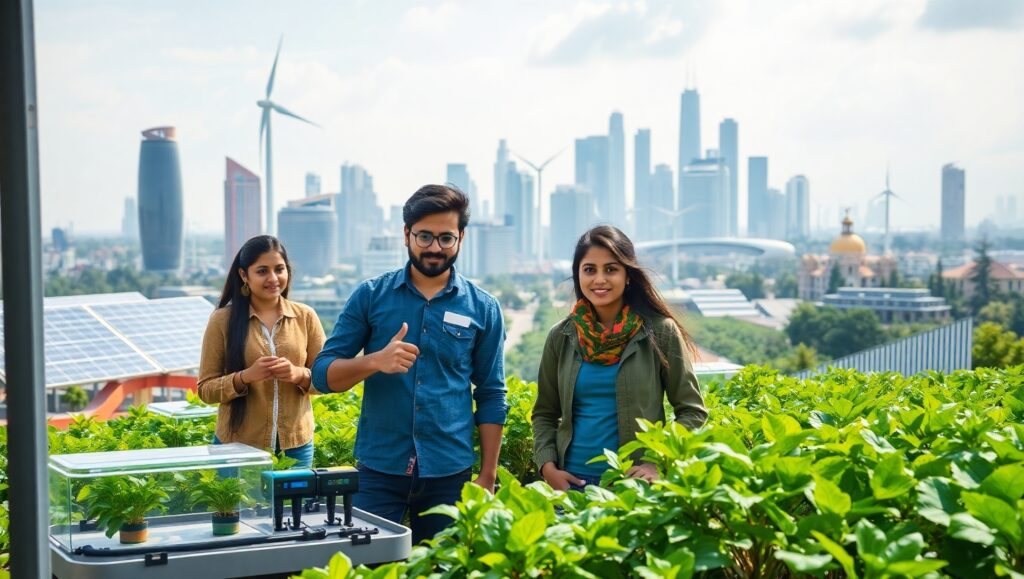Introduction
As India strides into the future, balancing rapid economic growth with environmental sustainability has become a national priority. The country faces significant ecological challenges—air and water pollution, deforestation, rising carbon emissions, and a growing waste crisis. In response, a new generation of Indian entrepreneurs is turning these challenges into opportunities. GreenTech startups, which blend technology with eco-conscious practices, are at the forefront of this transformation.
This article explores the rise of GreenTech startups in India, the sectors they are revolutionizing, the key players, the challenges they face, and the path forward. With a focus on sustainability, innovation, and impact, these startups are not just businesses—they’re building the foundation for a cleaner, greener India.
What Is GreenTech?
GreenTech, short for Green Technology, refers to technologies and innovations that aim to reduce environmental impact, promote sustainability, and address ecological issues. It spans several sectors, including renewable energy, waste management, electric mobility, sustainable agriculture, and water conservation.
GreenTech startups typically focus on:
- Energy efficiency
- Clean energy production
- Pollution reduction
- Eco-friendly products and packaging
- Recycling and circular economy solutions
- Sustainable farming techniques
The Need for Green Innovation in India

India is the third-largest emitter of greenhouse gases in the world. With urbanization, industrialization, and a growing population, the strain on natural resources is intensifying. Key environmental concerns include:
- Air Pollution: Major cities regularly breach safe air quality levels.
- Waste Management: India generates over 62 million tonnes of waste annually.
- Water Scarcity: 21 major Indian cities are expected to run out of groundwater by 2030.
- Energy Demand: Increasing energy consumption requires cleaner, renewable sources.
To address these issues, startups are developing scalable, tech-driven solutions that can be implemented across rural and urban settings.
Key Sectors Where GreenTech Startups Are Making an Impact
1. Renewable Energy
Startups in this sector are making solar, wind, and bioenergy more accessible and affordable:
- Oorjan Cleantech – Simplifies rooftop solar adoption for homes and businesses.
- ZunRoof – Offers smart solar solutions with app-based monitoring and AI optimization.
- Tata Power Solar (startup within a legacy firm) – Driving mass solar adoption.
2. Electric Vehicles (EVs) & Mobility
India’s push for e-mobility has birthed numerous innovative startups:
- Ather Energy – High-performance electric scooters with smart connectivity.
- Yulu – Micro-mobility EV solutions for urban commute.
- Ola Electric – Making EVs mainstream through wide accessibility and infrastructure.
3. Waste Management & Recycling
GreenTech is transforming how India handles its waste:
- Recykal – A digital waste commerce platform connecting waste generators with recyclers.
- Karma Recycling – Facilitates reuse of electronic devices.
- EcoReco – Sustainable waste disposal and recycling solutions for corporates and cities.
4. Water Conservation & Purification
Startups addressing India’s water crisis:
- Uravu Labs – Extracts clean drinking water from air using solar energy.
- Swajal – AI and IoT-powered smart water purification systems.
- Jal Technologies – Water ATMs and decentralized purification systems for rural areas.
5. Sustainable Agriculture
Agri-focused GreenTech startups are ensuring sustainability in food production:
- AgroStar – Provides eco-friendly agri-inputs and crop advisory.
- Ninjacart – Reduces food waste with an efficient farm-to-market supply chain.
- EF Polymer – Converts organic waste into eco-friendly water-retaining polymers for farmers.
6. Green Building and Eco-Conscious Construction
Eco-friendly construction materials and energy-efficient designs:
- Carbon Craft Design – Converts air pollution into usable tiles.
- Bamboo House India – Promotes bamboo as an eco-construction material.
- Greentivity – Specializes in green insulation and sustainable interior solutions.
Role of Government & Policy in Driving GreenTech

India’s commitment to sustainability is backed by a variety of government initiatives:
- National Electric Mobility Mission Plan (NEMMP)
- Faster Adoption and Manufacturing of Hybrid and EV (FAME) scheme
- Startup India Green Fund
- Swachh Bharat Mission
- Solar Park Scheme
Policy support, subsidies, and public-private partnerships are giving GreenTech startups the push they need to scale.
Challenges Faced by GreenTech Startups
Despite their promise, these startups face multiple challenges:
1. High Initial Capital Requirements
Setting up clean energy infrastructure or recycling plants is capital intensive.
2. Consumer Awareness and Adoption
Sustainability is still a growing concept in India; convincing consumers remains a hurdle.
3. Regulatory and Bureaucratic Delays
Licensing, compliance, and permissions often slow down projects.
4. Access to Funding
VCs are more inclined toward fast-scaling tech startups over hardware-heavy GreenTech ventures.
5. Talent Shortage
Specialized skills in sustainability, environmental engineering, and clean tech are limited.
The Socio-Economic Impact of GreenTech Startups
GreenTech startups are not just solving environmental problems; they’re creating:
- Jobs in clean energy, waste management, and e-mobility.
- Awareness about sustainability and eco-conscious living.
- Rural Empowerment, by bringing solar power and water solutions to underserved areas.
- Circular Economies, by promoting reuse, recycling, and resource optimization.
Inspiring Case Studies
1. ZunRoof – Empowering Middle-Class Homes with Solar
With over 10,000 installations, ZunRoof helps households reduce power bills while lowering carbon footprints. Their AI-based monitoring app ensures real-time solar performance tracking.
2. Recykal – Turning Waste into Opportunity
Operating in 20+ cities, Recykal has diverted over 100,000 tonnes of waste from landfills through digital waste tracking and ecosystem engagement.
3. Uravu Labs – Harvesting Water from Thin Air
Using atmospheric water generation, Uravu provides drinking water in arid regions with zero plastic use and no groundwater dependency.
The Road Ahead: Trends & Predictions
1. Carbon-Neutral Startups
More companies will embed carbon neutrality into their business models.
2. AI + GreenTech
AI will optimize resource usage, from energy grids to crop management.
3. Decentralized Clean Energy
Mini-grids and rooftop solutions will power rural and semi-urban communities.
4. Green Financing
Impact investing and green bonds will make more funds available.
5. Collaboration with Corporates
CSR initiatives will partner with GreenTech startups for ESG goals.
Conclusion
GreenTech startups in India are a beacon of hope in the global fight against climate change. With bold ideas and scalable innovations, they are creating a sustainable ecosystem where economic growth and environmental care go hand in hand. From solar rooftops in cities to atmospheric water in villages, these startups are changing the way India consumes, conserves, and creates.
To truly harness the potential of GreenTech, it’s essential that all stakeholders—governments, corporates, investors, and citizens—collaborate. Because a greener India is not just a dream—it’s a necessity, and it’s already taking root in the ideas and actions of today’s GreenTech entrepreneurs.
Disclaimer:The content provided in this blog post is for informational purposes only. The opinions expressed here are those of the author and do not necessarily reflect the views or opinions of Business Rahi. While we strive to ensure the accuracy and reliability of the information presented, we cannot guarantee the completeness, reliability, or suitability of the content for any particular purpose. Any reliance you place on such information is strictly at your own risk.
Buisiness Rahi is not responsible for any losses or damages arising from the use of the information shared in this blog post. We may feature links to external websites, but these do not constitute endorsements or recommendations. We encourage readers to conduct their own research and consult with professionals before making any business decisions.
For more information about our brand or policies, please refer to our official website or contact us directly.

